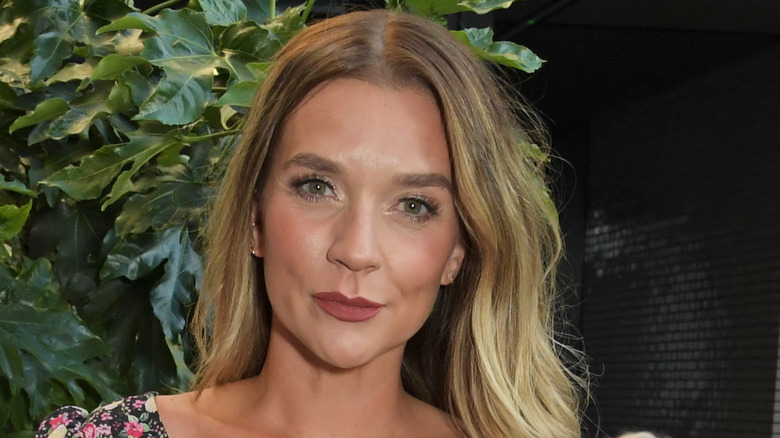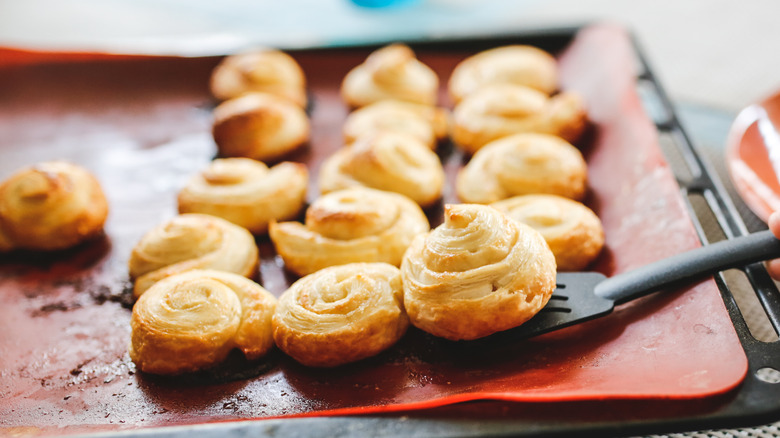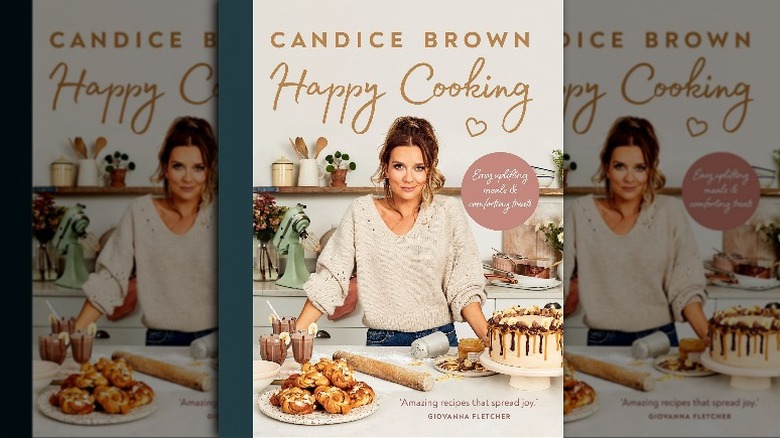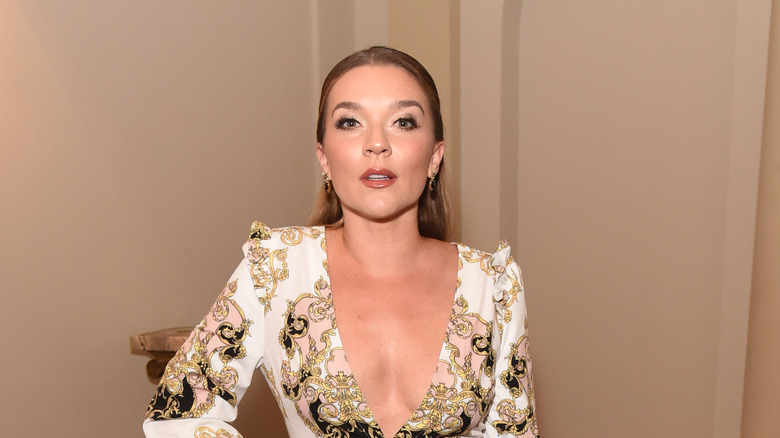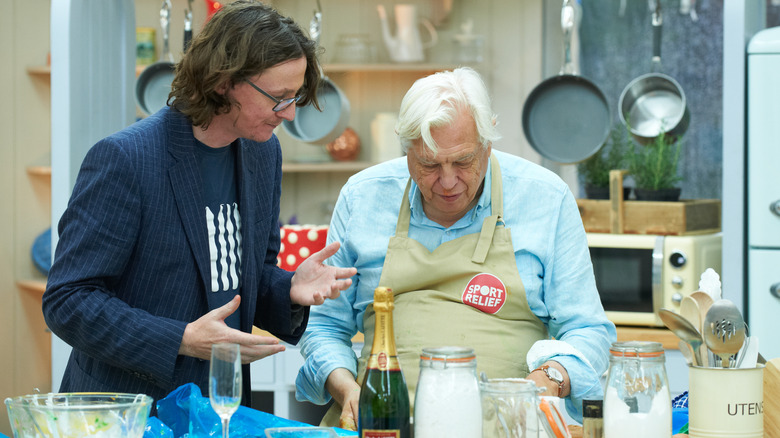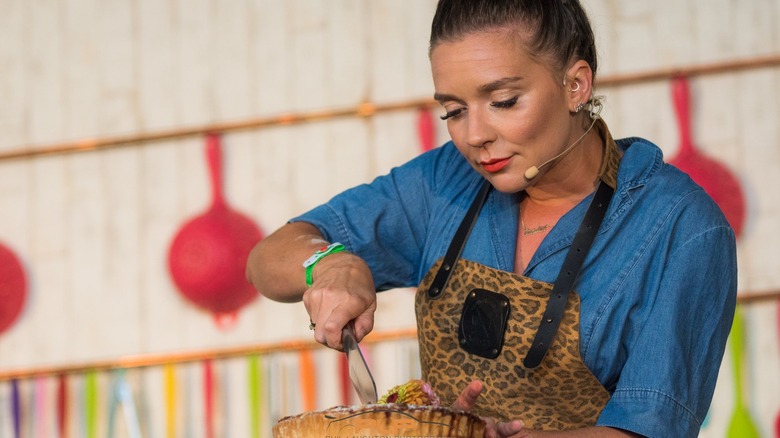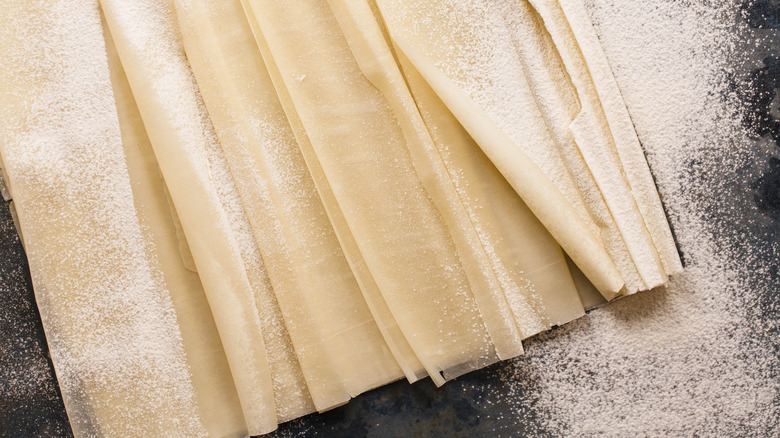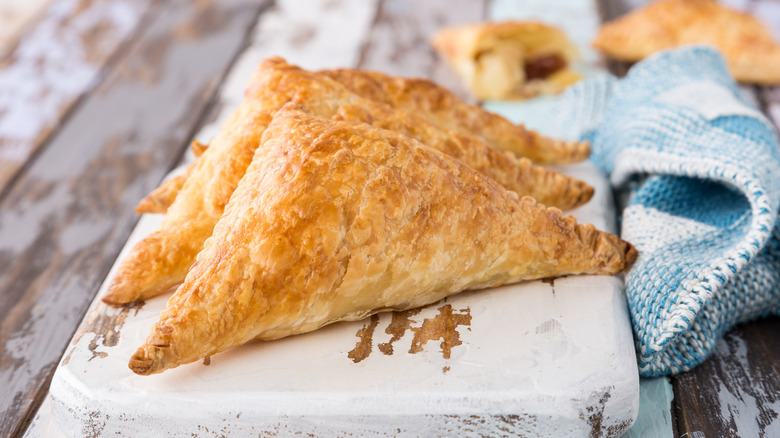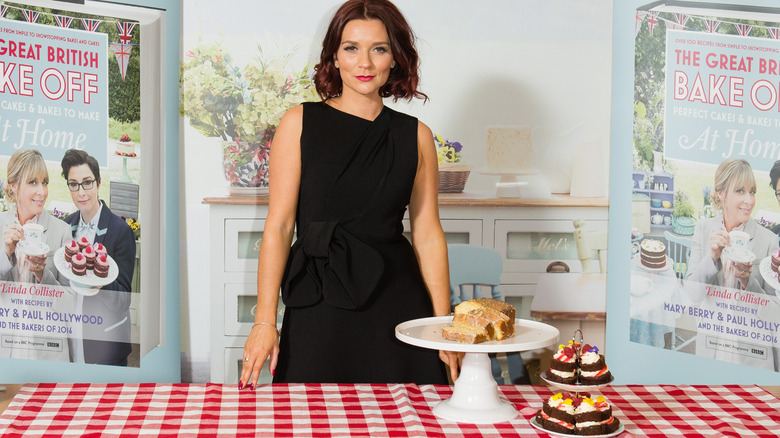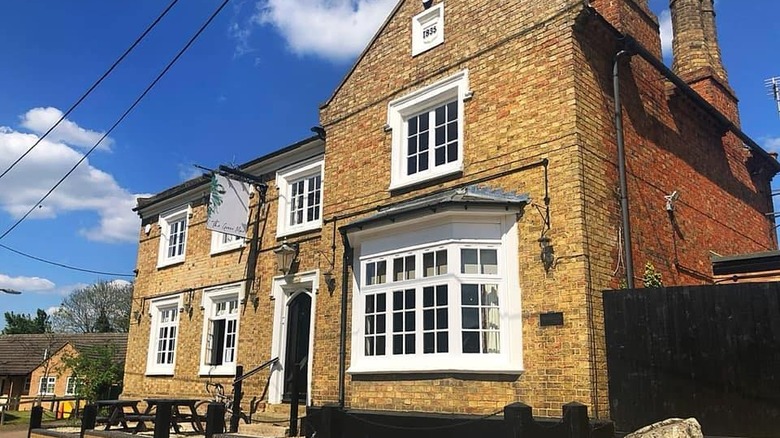Candice Brown Reveals What It's Really Like On The Great British Bake Off Set - Exclusive Interview
It's really no surprise Candice Brown ended up on "The Great British Baking Show," authoring multiple cookbooks, or even running her own pub: food was always going to play a central role in her life. Brown's love for cooking started when she was just a 4-year-old child. However inevitable as her successful career in the culinary world may seem today, don't think for a second that Brown takes any of it for granted, because it's just the opposite. In fact, not a day goes by that she's not thankful for it all, working in food being not just a career for her, but also a joy as well as a comfort.
When Brown spoke to Mashed during a recent interview, she was refreshingly forthright about the mental health issues she has faced over the years and shared how, time and again, cooking helped her through the hard times. Cooking has also, of course, been the backdrop for many of her happiest times as well, from baking with her grandmother as a girl to preparing entire Christmas feasts for her family to landing her a spot on "The Great British Baking Show." The latter would prove to be not only a wonderful experience in and of itself, but also truly life-changing.
For a person whose life's work started in those earliest years, the conversation began at the logical point: baking with her nan.
How Candice Brown first got into baking
What first got you into baking, and when did you realize it would play a bigger role than just a hobby for you?
So my Nan really was my kind of person. She was the apple of my eye. I spent a lot of time with my nan and granddad, growing up in North London. She was an incredible cook, she was an incredible baker, made everything from scratch. So wherever she was, I was normally by her side, and that was, a lot of time, in the kitchen, so I suppose I like to think I took that from her. I like to think I inherited that from her a little bit, and just having those memories of pulling through these weird brown dining room chairs through to the kitchen, standing up next to her, and her giving me the offcuts of pastry to make little jam tarts, or we'd make butterfly cakes where you'd cut the top of a cupcake off, cut it in half, and then stick it on with buttercream to make wings.
And I suppose I just realized, growing up, that I really enjoyed baking, I really enjoyed cooking, and I did it more and more. And when I was at uni, [I] obviously, lived away, so I was cooking all the time. I was brought up in a pub, so I was around really good home-cooked food, and felt quite natural in the kitchen. And it just developed more and more, and then as I got older, I started baking a lot more and more, and it became, I suppose, a little bit more natural to me.
Unfortunately, my nan passed away, and I fell into the role of doing the things that she did. So I took over cooking Christmas dinner for the family. I took on her recipes. I baked things for my granddad. And I don't know, it was just my happy place, and it just became a little bit of solace, actually, for me when my brain started being a little bit unkind, and it just developed like that. It went from a hobby to almost a complete obsession, passion, just somewhere I felt quite natural and I love being.
Was there ever a time in your teens or anything where it fell off, or has it just always been a part of your life?
So I suppose it's always been a part of my life. I've always loved food. I've always loved playing around with food and trying new things and traveling and understanding food from different cultures and different places, and so on. And it just evolved. I suppose it's probably been in the last, gosh, maybe between ... I suppose, probably, 15 years, beginning of my 20s, end of uni, where I really started pushing on and baking and cooking a lot more, and yeah, it's just something I've just always loved, and it's really just snowballed, I suppose, and I'm more obsessed with food than I've ever been.
Candice Brown talks about her newest cookbook
What was the inspiration behind your new cookbook, "Happy Cooking," who is the primary intended audience, and how's it going so far?
I think last year forced people, with the pandemic, and just locally, worldwide actually, for the first time, to stop and go: "Okay, we've now got time that we never did have, and okay, maybe I'm not enjoying this so much, and what do I do to pass this time, or how do I deal with kind of feelings?" And it seemed more and more people started gravitating towards the kitchen and started learning these processes. And more people I spoke to said: "Yeah, I love cooking. I love that process. I love kneading bread. It's like therapy." People really say: "If you want something to do with your hands, or you've got some aggression or anger or something to take out, make bread because you have to knead it for a good 15 minutes." It's that real physical act of food.
And it just became apparent that something that I'd always done and I still do, people were starting to do as well, and people were actually doing it without realizing, and I suppose that's where "Happy Cooking" was born. I always say, "I'm not a chef." I don't do the finesse, and I'd never put myself in that category of that. And it's not about reinventing the wheel, it's just how I do things, and if the way I do things, if I make cooking or I make food a little bit easier for someone that's having a really rough time or a really tough week, then something good has come out of it.
And the response has been incredible, actually. Every day, I find it terrifying because I'm still being very honest [in the book]. I'm being very open for the first time, and it's very different. It's a different situation. It's a different book to my first, but the response is great. And to see people relating to what you're saying can kind of [be like]: "Wow, I'm not alone." I don't feel like a weirdo. And I use those words. Sometimes, I'm like, "Candice, you're mental," and I have to just take a step back. And people really relate to those kind of thoughts, those feelings. And it's been great, actually, and I think that eradicates those terrifying thoughts that I do get.
Candice Brown on mental health struggles and how cooking helps
How have cooking and baking helped you when you struggle with mental health issues?
I've suffered with mental health issues for quite a few years now, probably going on seven, eight years, suffering with clinical depression, PTSD, phobia. And more recently, I got diagnosed with ADHD, though I think the ADHD diagnosis probably has always featured. It definitely has always been there and really links a few things in. But I realized very early on that baking was what I did when I was feeling pretty blue or pretty s***** or gray, whether that was for myself, whether it's for the process. And I just wanted to be all consumed by something that, I don't know, that took care of my hands, that took care of my head, that took care of other people. And I'd bake more than I knew what to do with. It'd just be me and I'd just be turning out breads or just playing with pastry and cakes and things like that, and it's just something that I started to do.
And obviously, "Bake Off," "The Great British Baking Show" being a huge thing here was something I loved so much, and just something I felt like I'd really love to have been part of. I never thought I could be part of it, never ever watched it and thought, "Yeah, I could do that. I could be better at that." It was just, I really wanted to be part of something so pure and so wonderful amongst people that loved it so much. And yeah, I went on "Bake Off," still with these mental health issues, and it was something that I hid for a long while. I hid the whole way through, and pretty much had never really spoken about it until the last couple of years.
This is such a thing in our times right now, talking about this stuff. Even just recently with Simone Biles.
It really is, and you're seeing it across the board. That's one of the other things I get people say, "Oh, but you look so confident, you sound so confident." And I say, "Well I can still function. I can have these mental health issues, these mental health diagnoses. I still function and I'm still successful, but what you don't see is behind closed doors." And the whole thing with Simone Biles and people actually going, "She can still function, can still do those vaults, can still do those record-breaking vaults." ... [But] behind closed doors, it's a real struggle sometimes ... and I think these sorts of movements and these conversations are so, so important across the board.
Life after The Great British Baking Show
How has your life changed since being on "The Great British Bake Off"?
I mean, more than I can probably explain, really. I was a teacher, so when I went on "Bake Off," I was looking after special educational needs group within the school, a secondary school, I'm a trained PE teacher, and worked with a lot of students with behavior problems and things like that. And cooking was my solace, cooking was my comfort when days were stressful, because it's tough being a teacher. And then I entered this show that I loved so much and I never thought I'd get on it, let alone win it. And then, all of a sudden, things just changed, and now I'm able to use food, that has become a hobby, as a job.
And I've met heroes, I'm friends with some of my food heroes, I own a pub with my brother, I write for a national newspaper, I've written two books, I made a cameo in a little film, I've been on television programs. Every day, it is mind-blowing, and I know how lucky I am, and I never take any of that for granted. I've loved every second of it. I loved the "Bake Off." I still love it, and I owe it everything. To have these opportunities, I'm always very, very thankful, and I always give 100% because I know how lucky I am and I know it could go at any time. But to say, I think, that whole cheesy line of "It's been a whirlwind," but it really, really has. It's been like a hurricane, whirlwind, and a whole heap of flour mixed in. I'm very, very lucky indeed. But I work hard and I love learning and I will continue pushing myself.
Candice Brown talks behind-the-scenes at Bake Off
What are a few things you wish people knew about "Bake Off," and what is it like behind the scenes?
Okay, so it really is just a tent ... so when it is hot, it is beyond hot. And when it is cold, it's absolutely freezing, and when it's wet, it floods. It is a tent. I think people think it might be a set and you've kind of got the tent sides, but it really is that. And it will always be the opposite of the weather that you want it to be, so for instance, [in] Chocolate Week, you can guarantee it's going to be 35 degrees [Celsius] outside, which means it's about 40 odd inside. When it's meringue, you need it to be completely bone dry, but of course, it's probably the wettest weather that we've seen since Noah's ark, and nothing's going to set, and you can always guarantee that's how it's going to be. But obviously, it makes for great television.
Then there are two washer-uppers who are who we call, the tent fairies, and they come in, and they clean down that tent when you've finished baking faster than anything I've ever seen before in my life. They are absolute angels. We all need those sorts. When I came out [at the end], I was like, "Who's doing the washing up for me now?" But they are just incredible, and the team works so hard. And also, probably one of the other things is, when they say "stop" that is it. You don't get any extra time. There's no "Oh, we'll let you finish, we'll let you put that on the plate." When they say, stop, you have to stop. And what I realized, it's surprising what you can get finished in one minute. When they go, "You've got one minute left," it's surprising what you can get done.
Competitive-wise, our year, we were a 12. We were great friends. We wanted each other to do well. It was a funny one because we laughed from the moment we met and we're still all great friends now, and we're still laughing. Paul [Hollywood] came in one day and he actually said, "Guys, you really need to start competing. This is a competition," and we were like: "Yeah, yeah, sure." When you walk into the tank, you're like, "Right, who needs some help?" We didn't want to see each other fail. We were in it for our love of baking and our love of the show, and that's only continued. I think other years, maybe there's been a little bit more competition and competitiveness, but for me, meeting 11 other people who have this common goal of just loving the show and just loving food and loving cooking and learning, was just incredible. But yeah, it's as lovely as it looks, it is as wholesome, it is as delightful, it is as messy as it looks, and it is as brilliant as you can imagine.
Candice Brown's hardest baking challenge
What is the hardest baking challenge you've had yet?
On the show, we had to make phyllo pastry from scratch in about, I think it was three hours or three and a half hours. That is ridiculous. Even Mary Berry doesn't make her phyllo from scratch, so actually having to work out how to make phyllo, and then actually having to think about how to get it that thin. It doesn't happen very often, but I came up with a little bit of a brainwave, and I was struggling with a pain in my neck from repetitive movements continually, and I thought, "I'm not going to be able to roll out this amount of phyllo. What can I do?" And I thought, "Right, pasta machine," so I turned up on the day, obviously, I'd practiced with the pasta machine, and it worked perfectly. I was the only one that had a pasta machine and I started thinking, "Oh no, I've messed up here," and the others are going, "Are you allowed that?" And I'm going, "I think so. Oh, no."
And yeah, it worked fine, and I just see everyone else really struggling with it. And when they came round, they said, "This is a stroke of genius. Well done," and I nearly wet myself with relief because it could have gone one or the other way. But to make phyllo pastry from scratch and get it as thin as they want and do that within that time constraint, and it was a sweet and a savory canape with decoration, everything like that. It was just, you do these impossible things and you get to the end of it, and yeah, it was just crazy.
Candice Brown's favorite thing to bake, and her least favorite
What is your absolute favorite thing to bake?
I love pastry. I was Star Baker on Pastry Week, again, doing things in a very short space of time, so obviously, now, I have a lot more time. But I love eating pastry, so that's probably got a lot to do with it. But I love the process of pastry. It's so versatile. You can do something really fast and easy and it can be sweet and it can be savory. You can do a long, drawn-out process, make your own croissants, and actually seeing that process and the jiggle of Danish pastry dough as it rises before it goes in the oven, it's just ... I don't know. I think it's just buttering. I'm sure I must've been French in a previous life, but anything to do with pastry. I love the process of it, I love making it, I love eating it. Yeah, just pastry.
And your least favorite thing to bake?
Do you know what? It's finesse decorating. As I said, I have ADHD and I think it's just patience. And so, obviously, at "Bake Off," there was a big part of decorating things like that, and I'd have to think, "Oh, God, what am I going to do to make this easier for me?" So I do my things in my own way, and I see these bakers who do the most beautiful things. I would always go simplistic, simple, done really, really well, because I know that's not my forte, so I'd rather do something simple and do it beautifully than over-complicate it and it look like a pile of s*** and be embarrassed about it, although I do say, "If it looks rubbish, eat it with your eyes closed."
But yeah, I think it's that real finesse of decorating anything that's my [least favorite]. I love the process of baking, I love throwing everything in, I love watching things come together, rise, go from a pale cream to gorgeous golden brown. I love the steam, I love the smell. And then when it comes to the decorating or having to decorate, I don't know, 30 individual biscuits beautifully, I'd love to be able to have the patience and sit and do that, but I'd rather just be making a batch of biscuits. So it's probably the real finesse, beautiful decorating. I'll leave that to the skilled people, and just give me a bowl and a wooden spoon and I'll whip up the mix.
Candice Brown's tips for home bakers
What are some common mistakes you see home bakers making, and what are some of your best tips for home bakers?
So making sure your butter is really, really, really soft, not melted, but make sure your butter is at room temperature. It's left out, so it's at room temperature, so it really, really incorporates, because if you've got lumps of butter in the batter, it's going to spread in your cake mix. So yeah, so really, really good room temperature butter. One of the things you can do if you forget to do that, which I do quite a lot, is if you heat up a glass of water, or a cup of water, or put boiling water in a mug, or something like that, or in a bowl, leave that in there for a little while, put the butter on a plate and tip out the water, so put the hot bowl, essentially, over the butter. That should help bring on that room temp and warm it up enough, not to melt it, but to get it to a good consistency that you can mix it in.
Another one is just if you're adding things to cake mix, so whether it's fruit, or chocolate chips, or chunks, or dried fruit, if you toss it in a little bit of flour, it should stop it sinking. I say should, because sometimes it does. Cakes are all different. It depends on the heat and your mix and the oven and things like that, but it should hold its position. If you just toss them in a tiny little bit of flour, it holds the position in the cake mix.
Candice Brown talks about the hardships of running a pub during the pandemic
What has it been like owning and helping operate a restaurant during the ongoing pandemic?
Yeah, I mean, it's been tough. I own The Green Man pub with my brother, Ben. We grew up in pubs. Mom and Dad ran pubs for 25 years, so we knew it wasn't going to be easy, but what we didn't factor was, a year after opening, a worldwide global pandemic that would see us literally going from talking about a party [celebrating] being open for a year to being completely shut and not being able to pay our staff wages, and then having to think very fast, "What are we going to do to survive?" Because it was a case of survival. We have no backers. We don't have a brewery. It is ours. It's our time, it's our money. At one point, we did a takeaway, so I was doing all the cooking and it was me in the kitchen, my brother doing the deliveries, and his girlfriend, now fiancee, delivering the food, because we had to survive.
And I think one thing that's shown is the resilience of people. We are very lucky that we were able to keep going. But what also, I found, one of the ways of dealing with things, and I think it's how I deal with things mentally as well, is sometimes there's nothing you can do about it. There was nothing we could do about this situation. We just had to listen, do what we were told, and make the best of it. So it literally was a case of head down, right, okay, we can open, but people can't walk around, we can be open, but we need screens, okay, we need to shut, right, we can be open again, but we do this. And we just listened and we did what we could.
We, of course, built an extension during a pandemic because I mean, why wouldn't you when you've got no money coming in? It's been crazy, but we are back open. And we're one of the lucky ones because I know so many people have lost businesses, family businesses, restaurants, pubs, all sorts, and it's been horrendous, but we are lucky. We are back open. We're still learning every day. We're still having to adapt and listen. It's been tough, but it's resilience, head down, and push on, and just do what we can to survive, and hope that things get better, and yeah, we just talk to people and hope that people understand as well. It's always good when people understand.
Be sure to stop by the Green Man next time you find yourself in Milton Keynes, U.K. Pick up Candice Brown's book "Happy Cooking" and follow her baking adventures on Instagram.
